|
|
|
Sort Order |
|
|
|
Items / Page
|
|
|
|
|
|
|
| Srl | Item |
| 1 |
ID:
084002
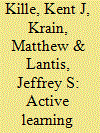

|
|
|
|
|
| Publication |
2008.
|
| Summary/Abstract |
This article reports on the results of a workshop on active teaching and learning sponsored by the Instituto de Relações Internacionais at the University of Brasilia. This 2-day, intensive workshop was designed by the authors to introduce teaching and learning strategies and to promote critical dialogue for professors and advanced students from institutions across Brazil. Details are provided on sessions that addressed the philosophy behind active teaching and learning, resources available for developing and carrying out exercises, a wide range of techniques, and the importance of debriefing and assessment. Finally, the article provides an evaluation of the workshop experience, emphasizing its potential value for training international relations instructors, both within the United States and across other international contexts, on ways to integrate active teaching and learning into their classrooms.
|
|
|
|
|
|
|
|
|
|
|
|
|
|
|
|
| 2 |
ID:
147693
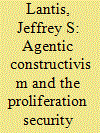

|
|
|
|
|
| Summary/Abstract |
Recent developments in global politics and international relations theory have raised questions about the strength of international norms. Critical constructivists identify instances of norm change, contestation, and even regress, arguing that norms may be less deeply internalized and more fragile than often assumed. This study builds on contemporary constructivist scholarship to advance a model of elite-driven norm change with stages of redefinition and substitution through contestation. It conducts a plausibility probe of the model by analyzing the development of the Proliferation Security Initiative, the US-led program that appeared designed to change normative principles from non-proliferation to counter-proliferation and from freedom of navigation on the high seas to maritime interdiction of suspect weapons and technology shipments. The model lends valuable insights on the evolution of norms to accommodate new realities over the last decade, and it suggests the need for more contingent and multi-linear theories of international cooperation.
|
|
|
|
|
|
|
|
|
|
|
|
|
|
|
|
| 3 |
ID:
054616
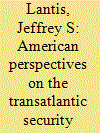

|
|
|
| 4 |
ID:
075820


|
|
|
| 5 |
ID:
159580


|
|
|
|
|
| Summary/Abstract |
This study revisits Carter and Scott’s model of congressional foreign policy entrepreneurship (2004, 2009, 2010) to evaluate how a new generation of legislative innovators, including Senators Rand Paul and Ted Cruz, may influence US foreign policy. Specifically, this study proposes two new types of foreign policy entrepreneurs in Congress—“revolutionaries” and “mercenaries”—and examines their different motivations, policy objectives, and strategies to attempt to influence or change state behavior. Case evidence suggests that in a new era of partisanship and polarization, more complex models of players, strategies, and measures of success are needed.
|
|
|
|
|
|
|
|
|
|
|
|
|
|
|
|
| 6 |
ID:
159971
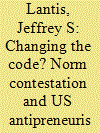

|
|
|
|
|
| Summary/Abstract |
Cyberspace appears to offer limitless possibilities for collaboration and economic opportunity in the twenty-first century, but cyber-attacks, breaches of privacy, and security threats also have become commonplace. In the face of these challenges, a number of governments have been locked in debates over the future of cyberspace governance, including the Russian Republic, the People’s Republic of China, and the United States. This study examines the ongoing contestation of the international normative architecture for cyberspace, with a focus on the United States’ role as a norm ‘antipreneur’, seeking to defend the status quo multi-stakeholder norm for a more open Internet from entrepreneurial efforts by Russia and China to establish multilateral governance with ‘cyber-sovereignty’. Drawing on recent advances in constructivist theory, the study explores antipreneurial strategies to contest efforts by entrepreneurs to introduce new norms, as well as implications for norm development and change. Process tracing is employed to examine cyberspace governance debates. The study concludes by discussing prospects for an International Code of Conduct for Cyberspace, as well as theoretical and political implications of antipreneurship in modern norm contestations.
|
|
|
|
|
|
|
|
|
|
|
|
|
|
|
|
| 7 |
ID:
107576
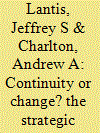

|
|
|
|
|
| Publication |
2011.
|
| Summary/Abstract |
Important puzzles remain in security policy literature, including whether strategic culture can change over time, and if so, under what conditions. This study proposes a model of strategic cultural change that identifies key actors and conditions at work in the process. The article then applies the model to chart the evolution of Australian security policy in the past two decades. We find that structural changes, including geostrategic situation and new security threats, coupled with elite interpretation and discourse, have produced a new "regional defense plus" strategic cultural frame for Australia. This, in turn, has led to measureable changes in defense policy. This work concludes with insights on the implications of change for the broader literature on strategic culture and constructivist security studies.
|
|
|
|
|
|
|
|
|
|
|
|
|
|
|
|
| 8 |
ID:
127622
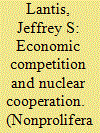

|
|
|
|
|
| Publication |
2014.
|
| Summary/Abstract |
The number of bilateral nuclear cooperation agreements surged during the "nuclear renaissance" of the past decade. This proliferation is only partially explained by the prevailing approaches that focus on strategic imperatives. To supplement these explanations, this study draws on neoliberal models of economic competition to posit that bilateral agreement negotiations also exhibit conditions of "uncoordinated interdependence" and maneuvering to gain market share. Case evidence suggests the contours of supplier state bids for civilian assistance are determined at least as much by considerations about economic competition as they are by positive strategic goals. In addition, this study identifies several cases of cooperation where there appears to be little or no strategic motive for export agreements. The study concludes that patterns of economic competition and the influence of peers in defined competitive spaces alter material payoffs and impact policies. It also identifies a surprising role for principled restraint in dampening strategic and economic competition in some dyads.
|
|
|
|
|
|
|
|
|
|
|
|
|
|
|
|
| 9 |
ID:
080858


|
|
|
| 10 |
ID:
051628
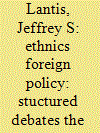

|
|
|
| 11 |
ID:
164671


|
|
|
|
|
| Summary/Abstract |
Scholars have examined the influence of intraparty factionalism on government stability and policy development in democratic systems for some time, yet factionalism in major political parties in the United States remains understudied. This article draws on scholarship on minority influence from social psychology, as well as studies of party polarization and coalitions in comparative politics, to explore the impact of factionalism in the US Congress on support for foreign policy initiatives. It proposes a novel framework to examine the longitudinal impact of the Freedom Caucus or Tea Party in the Republican Party on foreign policy initiatives championed by the majority. It conducts a plausibility probe of the model linking factionalism, minority influence strategies, and delays in establishment progress on foreign policy through case studies of comprehensive immigration policy reform debates and Trade Promotion Authority for the Trans-Pacific Partnership. The paper concludes that factions that demonstrate persistence and consistency in support of minority positions do appear to influence the scope and direction of foreign policy commitments, votes on major legislation, and nonvotes over time. It also offers suggestions for future study of more contingent and multilinear models of foreign policy processes in comparative perspective.
|
|
|
|
|
|
|
|
|
|
|
|
|
|
|
|
| 12 |
ID:
105206
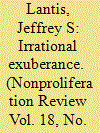

|
|
|
| 13 |
ID:
070958
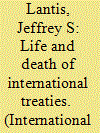

|
|
|
|
|
| Publication |
2006.
|
| Summary/Abstract |
The ratification process for international treaties has become increasingly politicized in many democratic states. But while scholars have devoted attention to the negotiation of international agreements, few have studied ratification struggles that define the ultimate success or failure of international commitments. Fewer still have examined the dynamics of this process in comparative perspective. This article explores the politics of contemporary international treaty ratification processes across democratic regimes. Drawing on two-level game theory, I posit that the likelihood of ratification success is often a function of elite strategies for treaty ratification, regime type (which conditions executive-legislative relations), interest group pressure, and public opinion in the domestic political environment relative to international commitments. A structured, focused comparison of case studies analyzes experiences of the United States, Canada, and Germany in ratification struggles in the past decade. I conclude that the likelihood of successful treaty ratification across issue areas depends primarily upon executive strategies and regime type within certain scope conditions. These results provide evidence of ways that external-internal linkages can affect treaty ratification and suggest the need for greater attention to the development of scope conditions of international cooperation.
|
|
|
|
|
|
|
|
|
|
|
|
|
|
|
|
| 14 |
ID:
158675
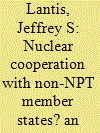

|
|
|
|
|
| Summary/Abstract |
Supporters of the nuclear nonproliferation regime argue that international agreements, power politics, and emerging standards of legitimacy have generated a robust nuclear nonproliferation norm. This optimism is mirrored in early social constructivist international relations theory, which emphasizes the constitutive and regulatory power of international norms. Conversely, this article explores how recent developments in global politics and international relations theory may show how vested players can change normative architectures. This project develops a model of elite entrepreneurship in norm change that includes stages of redefinition and substitution through contestation. It conducts a plausibility probe of the model in the development of the 2008 U.S.–India Civil Nuclear Cooperation Agreement, a case of U.S.-driven norm change. The article concludes that this alternative agency-based model lends insights on what may be a continuous, and consequential, evolution of the nuclear nonproliferation norm.
|
|
|
|
|
|
|
|
|
|
|
|
|
|
|
|
| 15 |
ID:
145723


|
|
|
|
|
| Summary/Abstract |
There is a lively debate in constructivism today regarding the constitutive and regulatory power of international norms. First-generation studies assume that when states support norms they have fully “internalized” normative ideals. However, the scholarship tends to privilege structure over agency and may not account well for changes in state policies that impact normative architectures. This study extends recent work on agentic constructivism and international law to develop a typology of “norm stewardship” and model of norm change. It conducts a plausibility probe of the new stewardship model by comparing case studies of US policies on exports of sensitive uranium enrichment and reprocessing (ENR) technologies. Case evidence suggests that variations in norm internalization and dissonant norm strains impact multilateral initiatives on nonproliferation. This study concludes with a discussion of wider implications of norm stewardship for theories of international cooperation.
|
|
|
|
|
|
|
|
|
|
|
|
|
|
|
|
| 16 |
ID:
160125


|
|
|
|
|
| Summary/Abstract |
This study examines the effects of contestation on individual norms that are embedded in larger norm clusters. We define norm clusters as collections of aligned, but distinct norms or principles at the center of a regime. Norm clusters include multiple norms that can be insulated from contestatory challenges by degrees of cohesion, institutionalisation, and legalisation. While some constructivists argue that the most important dynamic to study is ‘robustness’ of individual norms, we contend that ‘resiliency’ of norm clusters offers a richer assessment of prospects for international cooperation and long-term impact on state behaviours. Thus, this study distinguishes conceptually between different structural layers that can generate various effects in conjunction with norm contestation. We add a third, or intervening layer of explanation with norm clusters, between the intersection of norms (lowest layer) and normative structures (broadest layer). To explore this argument, comparative case studies examine the resiliency of two prohibitionary norms – the nuclear disarmament norm within the non-proliferation regime and the norm banning assassination of foreign adversaries, which is not embedded in a regime structure. While the robustness of individual norms may be challenged, our results suggest a role for resilient structures in promoting overall longevity of norm clusters.
|
|
|
|
|
|
|
|
|
|
|
|
|
|
|
|
| 17 |
ID:
092485
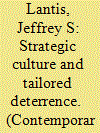

|
|
|
|
|
| Publication |
2009.
|
| Summary/Abstract |
Critics charge that American deterrence and counter-proliferation strategies failed to stem the tide of national security threats or hinder the spread of weapons of mass destruction over the past decade.
|
|
|
|
|
|
|
|
|
|
|
|
|
|
|
|
| 18 |
ID:
132862
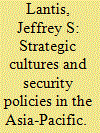

|
|
|
|
|
| Publication |
2014.
|
| Summary/Abstract |
Reflecting the culturalist turn in security studies, this special issue shows how one of the most powerful tools of security studies illuminates the origins and implications of the region's difficult issues, from the rise of China and the American pivot, to the shifting calculations of other regional actors. Strategic culture sometimes challenges and always enriches prevailing neorealist presumptions about the region. It provides a bridge between material and ideational explanations of state behaviour and helps to capture the tension between neoclassical realist and constructivist approaches. The case studies survey the role of strategic culture in the behaviours of Australia, China, Japan, the Philippines, South Korea, and the United States. They show the contrast between structural expectations and cultural predispositions as realist geopolitical security threats and opportunities interact with domestic elite and popular interpretation of historical narratives and distinctive political-military cultures to influence security policies. The concluding retrospective article devotes special attention to methodological issues at the heart of strategic cultural studies, as well as how culture may impact the potential for future conflict or cooperation in the region. The result is a body of work that helps deepen our understanding of strategic cultures in comparative perspective and enrich security studies. As disputes intensify over territory and resources, as regional militaries develop and leaders adjust their strategic calculus and defence commitments, the dovetailing of culture and politics in the Asia-Pacific shows through.
|
|
|
|
|
|
|
|
|
|
|
|
|
|
|
|
|
|
|
|
|